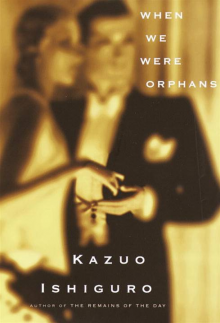British writer Kazuo Ishiguro won the 1989 Booker Prize for The Remains of the Day, which sold over a million copies in English alone and was the basis of a film starring Anthony Hopkins. Now When We Were Orphans, his extraordinary fifth novel, has been called "his fullest achievement yet" (The...
show more
British writer Kazuo Ishiguro won the 1989 Booker Prize for The Remains of the Day, which sold over a million copies in English alone and was the basis of a film starring Anthony Hopkins. Now When We Were Orphans, his extraordinary fifth novel, has been called "his fullest achievement yet" (The New York Times Book Review) and placed him again on the Booker shortlist. A complex, intelligent, subtle and restrained psychological novel built along the lines of a detective story, it confirms Ishiguro as one of the most important writers in English today. London's Sunday Times said: "You seldom read a novel that so convinces you it is extending the possibilities of fiction."The novel takes us to Shanghai in the late 1930s, with English detective Christopher Banks bent on solving the mystery that has plagued him all his life: the disappearance of his parents when he was eight. By his own account, he is now a celebrated gentleman sleuth, the toast of London society. But as we learn, he is also a solitary figure, his career built on an obsession. Believing his parents may still be held captive, he longs to put right as an adult what he was powerless to change as a child, when he played at being Sherlock Holmes - before both his parents vanished and he was sent to England to be raised by an aunt. Banks' father was involved in the importation of opium, and solving the mystery means finding that his boyhood was not the innocent, enchanted world he has cherished in memory. The Shanghai he revisits is in the throes of the Sino-Japanese war, an apocalyptic nightmare; he sees the horror of the slums surrounding the international community in "a dreamscape worthy of Borges" (The Independent). "We think that if we can only put something right that went a bit awry, then our lives would be healed and the world would be healed," says Ishiguro of the illusion under which his hero suffers. It becomes increasingly clear that Banks is not to be trusted as a narrator. The stiff, elegant voic
show less






 7 years ago
7 years ago




 12 years ago
12 years ago